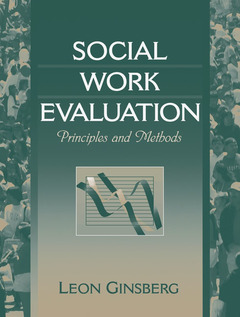Social work evaluation
Langue : Anglais
Auteur : GINSBERG Leon

This book is a practical overview of evaluation in social work by a distinguished author who has also been an evaluator and an agency administrator. KEY TOPICS: This book includes an evaluation of one's own practice, the use of group research designs for evaluation practice, needs assessment, and evaluation ethics. Chapters also cover unique subjects, including chapters on licensing, accreditation, auditing, accounting,, and other methods that social work administrators and practitioners must often address. The book includes examples of evaluations conducted by organizations such as the Manpower Development Research Corporation and the Urban Institute, which are major forces in public policy decisions but which have not been extensively covered in the social work literature. MARKET: For practicing social workers or anyone interested in topics related to social work evaluation.
Chapters conclude with Conclusion and Questions for Further Study. Preface. Acknowledgements. Part 1: THE CONTEXT OF EVALUATION IN SOCIAL WORK.. 1.Introduction The Accountability and Evaluation Phenomena is Social Work: The Context of Evaluation in Social Work. Historical Movements Towards Evaluation in the Human Services Profession. The Government Performance and Results Act of 1993. Funding Organizations. Purpose and Scope of the Book. Historical Origins of Evaluation. External and Academic Critics. Internal Critics. Evaluations of Practice Effectiveness. Accreditation. Licensing. Voluntary Professional Credentials. Types and Methods of Evaluation Formative and Summative, Process and Outcome. 2.The Administration of Ethics and Values. The Variability and Sensitivity of Evaluations. The Administration of Evaluations and Link to Purposes. The Business of Evaluation. Types of Evaluations. Evaluation Ethics. The National Association of Social Workers Code of Ethics and Evaluations. Minority Issues and Evaluation. Technology Ethics. Commissioning the Evaluation. Accountants and Attorneys. 3.Approaches to Evaluation. The Pervasiveness of Evaluation. Quantitative vs. Qualitative Evaluation. Cost-Benefit Analysis. Unintended Consequences. Studies of Satisfaction. Needs Assessment. Single Subject Design. Experimental Approaches. Utilization-Focused Evaluation. Fraud and Abuse Detection. Design Evaluation. Journalistic Evaluations. Part 2: CLASSIC EVALUATION PROCESSES FOR SOCIAL WORK PROGRAMS.. 4.Accounting and Auditing. The Importance of Finances. Possible Mishandling of Funds in Human Services Programs. Innumeracy Number Illiteracy and Its Consequences. Budgets. Accounting. Nonprofit and Profit-Making Organizations. Misrepresentation. Purchases of Services. Handling Cash. Expenses. Proprietary Social Work Agencies and Programs. Auditing. Government Audits. 5.Licensing of Social Work Agencies and Social Workers. Government Regulation of Facilities and Professions. Licensing of Group Care Facilities. Concerns of Facilities Owners. Licensing Bodies. Operations of Licensing. Licensing of Individual Practitioners. The American Association of State Social Work Boards (Association of Licensing Boards). Voluntary Credentials. 6.Accreditation of Social Work Programs. Definition of Accreditation. Inputs, Outputs, Outcomes. Focus on Outputs. Voluntary Nature of Accreditation. Developing Standards and Guidelines. Self-Studies. Site Visits. Commissions, Committees, and Professional Staff. Agency Accreditation. Council on Accreditation of Services for Families and Children. Programs Accredited. Joint Commission on the Accreditation of Healthcare Organizations. Commission on the Accreditation of Rehabilitation Facilities. Other Accreditation Examples. Educational Accreditation. Professional Education Accrediting Bodies. Social Work Education Accreditation. Quality and Accreditation. Part 3: INTERNAL EVALUATIONS IN SOCIAL WORK.. 7.Program Monitoring and Quality Control. Definitions. Monitoring. Monitoring Individual Saving Account Savings. Quality Control and Quality Assurance. Quality and the Human Services. Total Quality Management. Demings 14 Points. Flowcharts. Pareto Diagrams. 8.Single Subject Designs. Single Subject Design Does Social Work Work? Basic Concepts. Single Subject Processes and Procedures. The A-B Design. Multiple Intervention Approaches. Time Series Designs and Statistics. Instruments and Scales. Graphics and Statistics. SINGWIN Software. Assessment Scales. 9.Assessment of Needs and Studies of Satisfaction. Needs Assessment. Needs Assessment Procedures and Principles. Focus Groups and Public Forums. Data Sources for Assessing Need. Studies of Satisfaction. Skewed Reactions. Examples of Satisfaction Instruments. Part 4: SOCIAL RESEARCH METHODS ND CONCEPTS IN EVALUATION.. 10.Experimental Research Designs in Evaluation, by Dr. Michelle Carney (University of South Carolina, College of Social Work). Introduction. The Evaluation Continuum. Exploratory Designs. Descriptive Designs. Explanatory Designs. Experimental Designs. Elements of a Strong Program Evaluation. Randomization. Matching. Alternative Explanations. Threats to Internal Validity. History. Maturation. Testing. Instrumentation Error. Statistical Regression. Selection Bias. Experimental Mortality. Reactive Effects. Statistical Conclusion Validity. Eliminating Alternative Hypothesis. External Validity. Research Designs. Pro-Experimental Designs. One-Shot Case Study. Cross-Sectional Survey Design. Longitudinal Case Study Design. One-Group Prestest-Posttest Design. Static Group Comparison. Quasi-Experimental Designs. Nonequivalent Control Group Design. Time Series Design. True Experimental Designs. Pretest-Posttest Control Group. Solomon Four-Group Design. Posttest-Only Control Group Design. 11.Some Fundamentals of Program Development, Program Evaluation, and Accountability, by Dr. Abraham Wandersman (University of South Carolina, Department of Psychology). Accountability. It Sounded Like a Good Idea, but Is It Really Working? The Logic of Program Evaluation. A Four-Step Model of Program Evaluation. Examining Mentoring from a Program Evaluation Perspective. Comprehensive Quality Programming: Nine Essential Strategies for Implementing Successful Programs. Using CQP Strategies to Continuously Improve Programs. Examples of CQP in Action. 12.Outcome Evaluations and Indicators. Management Information Sitemaps. Assessment and Evaluation Tools. The Georgia PERMES System. Management Indicators and Audits. Cost-Benefit Analysis. The United Way Outcomes Measurement Approach. Part 5: EXAMPLES OF PROGRAM EVALUATIONS.. 13.Significant Evaluations and the Authors Evaluation Experiences. The Urban Institute. Other Welfare Reform Evaluations. The Manpower Demonstration Research Corporation. Work Incentives and Unintended Consequences. A University Study of Welfare Transitions. Temporary Assistance for Needy Families. The Authors Encounters with Program Evaluation. 14.The Evaluation of Large Government Programs, by Dr. Larry Nackerud (University of Georgia, School of Social Work). Large Government Evaluation Pitfalls. Head Start, Model Cities, and Intensive Family Preservation Programs. Addressing the Over Reliance Pitfall. Addressing the Immediate Concern vs. Bigger Issues Pitfall. Basis of Comparison & Sampling. In-Home Data Collection. Reference
Date de parution : 02-2002
Ouvrage de 308 p.
© 2024 LAVOISIER S.A.S.



